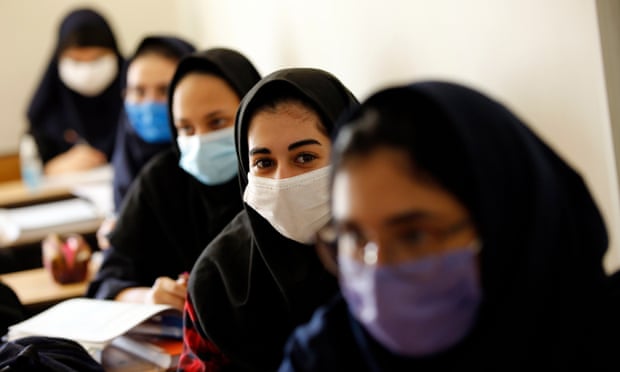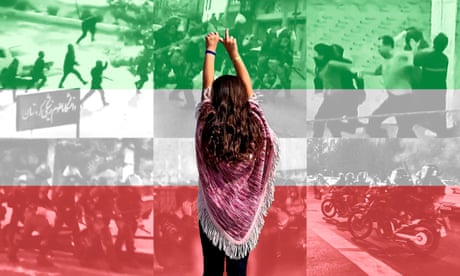|
Iranian officials to investigate ‘revenge’ poisoning of schoolgirls
The attacks on female students – called an act of ‘biological terrorism’ – are thought to be retaliation for protests against hijabs in the country
guardian.org, Deepa Parent
Mon 27 Feb 2023 18.26 GMT
Last modified on Tue 28 Feb 2023 22.57 GMT
Iranian authorities have confirmed they are investigating reports that several schoolgirls have been poisoned as “revenge” for the role young women played in recent protests against the mandatory hijab.
Iran’s deputy education minister, Younes Panahi, told reporters yesterday: “After the poisoning of several students in [the city of] Qom … it was found that some people wanted all schools, especially girls’ schools, to be closed.”

The attacks took place in cities including Qom and Borujerd. Photograph: Abedin Taherkenareh/EPA
He added: “It has been revealed that the chemical compounds used to poison students are not war chemicals … the poisoned students do not need aggressive treatment and a large percentage of the chemical agents used are treatable.”
Dr Homayoun Sameyah Najafabadi, a member of the parliament’s health commission, also confirmed the poisoning of schoolgirls “in cities such as #Qom and #Borujerd has been done intentionally”.
Speaking to the Guardian on condition of anonymity, a doctor who specialises in the treatment of poisoning victims said: “With the data that’s available, the most probable cause of this poisoning could be a weak organophosphate agent. Even if some of the poisoned pupils show a sign of severe sweating, excess salivation, vomiting, intestinal hypermotility and diarrhoea, then the attack was done using this agent.”

‘They used our hijabs to gag us’: Iran protesters tell of rapes, beatings and torture by police
Read more
The doctor said they believed the motive was to “scare the protesters by using extremist groups [radical Islamists] inside and outside the country”.
“They want to take revenge on schoolgirls, who are the pioneers of the recent protests,” the doctor said. “Never before have I treated someone who was poisoned with organophosphate agents. The only cases I treated were workers who were exposed to these agents in agricultural pesticides.”
The attacks have led to girls staying away from school. A teacher from Qom – which is about 85 miles south of the capital Tehran – told Radio Farda that out of 250 students, only 50 attended classes. Last week angry parents protested outside the governor’s office in #Qom and several schools have been closed due to the pending investigation.
Masih Alinejad, an Iranian human rights activist based in New York, told the Guardian: “In my opinion, this chemical attack is revenge by the Islamic Republic against the brave women who [rejected] the mandatory hijab and shook the ‘Berlin Wall’ of [Ayatollah Ali] Khamenei.
“As the Islamic State Iranian regime hates girls and women, I call on women across the globe – especially schoolgirls – to be the voice of Iranian students and call on the leaders of democratic countries to condemn this series of poisonings and isolate Khamenei’s regime,” she said.
“I call this biological terrorism, and it should be investigated by the UN. We need an outside organisation to investigate as soon as possible.”
غزاله چلاوی، قربانی جنایت ج. اسلامی
|

